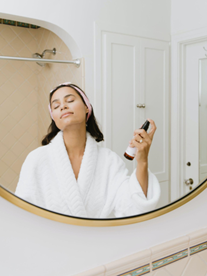Happy New Year with New Skin!

Happy New Year with New Skin!
AUTHOR/EDITOR: Nigelle Fredette
MARCH 15, 2023
Happy New Year! A new year begins with a fresh start for all. Today’s issue will focus on Vitamin A, its benefits for your skin and how to make it a part of your skincare routine.
You likely hear about vitamin A and its benefits for your skin through magazine ads, commercials, medical reports and more. Let’s see if this word rings a bell. Here goes… Retinol! Does this word resonate with you? If not, it should do!
What is Retinol?

As previously mentioned, Retinol is a synthetic derivative of vitamin A. While it can be found in food (eggs, carrots and sweet potatoes) or taken as a dietary supplement, it is usually presented in the form of a gel, serum, emollient or cream. Typically, Retinol will be used as a topical treatment, which means the person will apply it to their skin. Once on the skin, the Retinol will penetrate through the various layers of the skin, eventually converting itself into retinoic acid before working its magic!
How does it help your skin?

Skin is the largest organ in your body. With that being said, it is so important to pay close attention to your skin. It constantly changes, and products like Retinol impact ’cell turnover.’ Cell turnover is a process that the body uses to replace existing skin cells with fresh, new skin cells. In essence, cell turnover is best described as “skin rejuvenation.” Skin rejuvenation is when old, damaged cells are shed and replaced with new young cells. This process is important for the maintenance of healthy-looking skin. Every day, your body is shedding skin cells due to damage from various factors such as UV ray exposure, scratches, bruises, abrasions, acne, wind damage, bacteria and more. While this happens, skin cells will harden and eventually die. Your body will therefore produce new skin cells. Did you know that, on average, it takes 40 to 56 days for your epidermis to completely turn over?
Conquer Acne!

While many associate Retinol with its anti-aging benefits, it serves useful and beneficial for a broader range of reasons. Previously, as far back as the 1970s, Retinol was primarily used to treat patients with acne. This is because it promotes cell turnover and, by doing so, prevents pores from being clogged hence making it useful against acne. Additionally, Retinol helps prevent the skin from being damaged due to irritation caused by pimples. However, please be aware that acne is not the same for everyone. In some cases, an individual may need a prescription for a stronger concentration of Retinol to get the desired results.
Retinol can help diminish the appearance of fine lines and wrinkles.

Today, we often hear about how using Retinol helps with reducing fine lines and wrinkles. How does this happen? Well, once applied on the skin and absorbed deep within its layers, Retinol interacts with the skin cells and helps stimulate collagen. It helps to prevent collagen that pre-exists in your skin from ultimately breaking down. Once collagen production is increased, your skin will regain its elasticity. Firm, healthy skin means less sagging, wrinkles and fine lines.
Retinol will make your skin scream “healthy”!
Retinol’s ability to help shed dead skin cells from the top layer of the skin helps to fade hyperpigmentation. As the retinoid activates the cell turnover by encouraging new skin cell growth, the darker stained skin cells, such as freckles, acne scars and age spots, come off to reveal healthier new skin cells. After the cell turnover period, you will notice that your skin is brighter and healthier.
How do you include Retinol in your skincare routine?

Here are some suggestions on how you should incorporate Retinol into your skincare routine. First, speak with a skin care professional about the best option of Retinol for your skin. You should start with the lowest percentage of Retinol and increase it slowly. Following this, it is important to remember to alternate the days you use Retinol with another serum containing Alpha hydroxy acid. Additionally, make sure that when you are heading outdoors or in areas exposed to harmful UV rays, you wear sunscreen. Finally, you might notice your skin looks dry, irritated, or flaking while using Retinol. In this case, don’t hesitate to apply a nice moisturizer to help it regain the necessary moisture.
Maybe it’s time to try Retinol and see how it can help your skin. Be sure to remember that the results will be ready in a little over a month! There is no doubt that with the right skin care professional and consistent skin routine, you will notice results in no time! Happy Retinol, everyone!
